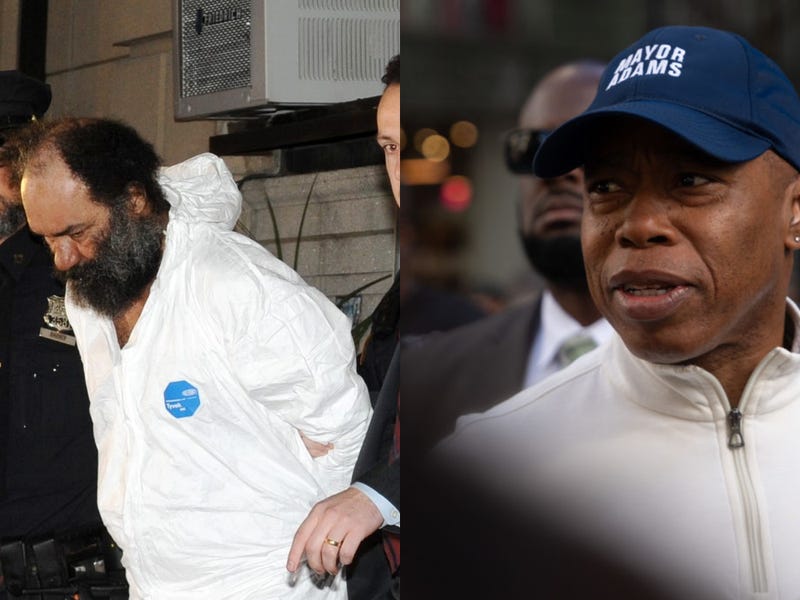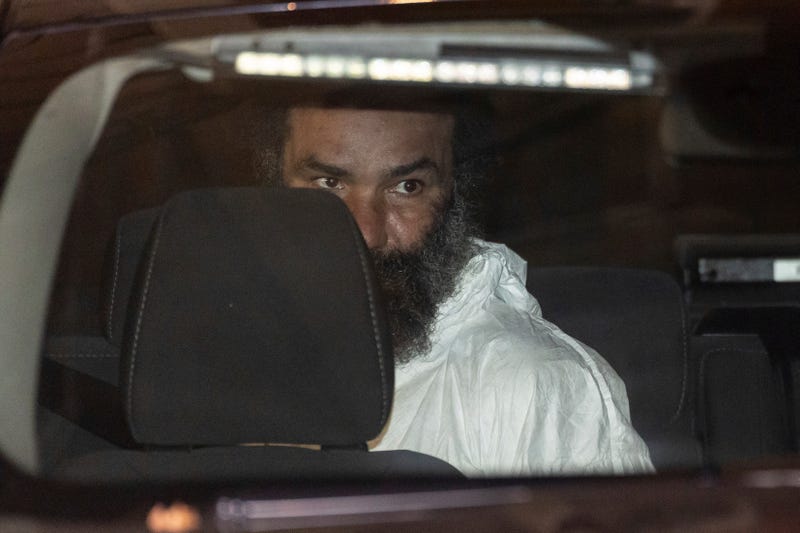
NEW YORK (1010 WINS) — The day after a stabbing spree by an emotionally disturbed man left three New Yorkers dead, Mayor Eric Adams restated support for a controversial directive he first introduced in 2022 that allows city officials the legal authority to involuntarily provide care to those suffering from severe mental health issues.
“Everybody said I was inhumane, that we just want to institutionalize our people, well, this is the result of that,” Adams said in reference to the killing spree. “This is the result of not taking actions and ignoring people who need help.”
Ramon Rivera, a 51-year-old homeless man with a history of arrests and severe mental illness, used kitchen knives to kill three people over the course of two and a half hours in Manhattan on Monday.

He was charged with three counts of first-degree murder for fatally stabbing 36-year-old Angel Lata Landi as he worked in Chelsea; a 67-year-old man fishing on the East River in Kips Bay; and 36-year-old Wilma Augustin, mother to an 8-year-old, as she walked in Midtown East.
“I talked about involuntary removal. We walk past people every day that we know they do not have the ability to make the right decisions to take care of themselves,” Adams said Tuesday. “This is a problem that was created when we closed the psychiatric facilities many years ago.”
Hours after Adams' media availability on Tuesday, New York State Sen. Brad Hoylman-Sigal and Assemblymember-elect Micah Lasher, both representing Manhattan, announced their proposal of the H.E.L.P. Act, which would expand the state mental hygiene law to expand authority to perform clinical evaluations for involuntary hospitalization and assisted outpatient treatment, requiring care coordination for people suffering from mental illness.
“Yesterday’s stabbings were just the latest devastating example of the need to reform New York State’s mental hygiene law to address the continued fallout from the closure of thousands of mental health beds across the state over the last several decades, which has caused individuals struggling with mental illness to languish on the streets and in the subways," Hoylman-Sigal said in a statement. "Rather than accept the status quo, the H.E.L.P. Act will grant additional mental health experts ... the authority to clinically evaluate and require treatment for those experiencing severe mental health issues who may pose a threat to themselves or others."
A November 2022 press release announcing Adams' directive includes his 11-point legislative agenda on psychiatric crisis care, and at his Tuesday press conference, the mayor expressed his continued desire to work with Albany to codify the Supportive Intervention Act into law in order to establish “real clarity around the authority we have of dealing with people with severe mental illness.”
The Adams directive in NYC rolled out training for police, EMS, clinicians and outreach workers to “ensure compassionate care,” but due to the case law not providing “extensive guidance regarding removals for mental health evaluations based on short interactions in the field,” the mayor is continuing to pursue broader state legislation, with the support of New Yorkers.
Upon announcement, the measure was met with pushback from some progressives in the mayor’s party.
Public Advocate Jumaane Williams, who criticized the mayor’s efforts to help New Yorkers suffering from serious mental illness in a report released just before the 2022 announcement, thanked Adams for putting attention on the issue but questioned the methodology of his directive.
“The mayor’s announcement leaves many details unspecified, questions unanswered, and the administration must provide more information on the intentions, implementation, and non-police investment in its plan,” Williams said at the time. “A framework that continues to center overreliance on police, diminishes the role of health professionals, and de-prioritizes the role of peer support will not be sustainable or effective in meeting the needs of New Yorkers in need or a city in crisis.”
Others, like longtime opponent of involuntary hospitalizations Harvey Rosenthal, the chief executive of the New York Association of Psychiatric Rehabilitation Services, outright opposed the measure.
“The mayor talked about a ‘trauma-informed approach,’ but coercion is itself traumatic,” Rosenthal told the New York Times.
In November 2023, a year after Adams launched his severe mental illness plan, City Hall released information regarding the directive’s impact. According to the mayor’s office, over 50 of the 100 hardest to reach New Yorkers living on city streets—identified as those who have been on the Coordinated Behavioral Health Task Force’s two “Top 50” lists—had been removed and were “stabilizing their lives in a hospital or another supportive setting.”
Hundreds more New Yorkers living on the streets who were believed to have untreated severe mental illness were connected with hospitals or evaluations, psychiatric beds were expanded and a broader deployment of clinicians were further positive results of the measure, according to city officials. On Tuesday, Adams said that the number of people reached had become thousands, but that more needs to be done.
“Advocating to get [the Supportive Intervention Act] passed is imperative. Advocating to get more psychiatric beds online is imperative,” Adams said. “Making sure that we communicate with the advocates and tell them we need to take a real look at this. The street corner is not a psychiatric ward. It’s not a psychiatric bed to sleep in the parks. We have to change our mindset.”
Turning the narrative back to the New Yorkers who were killed in Rivera’s stabbing spree, Adams challenged opponents of the policy and involuntary hospitalization to consider what he called the reality of the mental health situation.
“Idealism collides with realism when you have three innocent New Yorkers that are stabbed and murdered,” Adams said. “That is, that’s a wake-up call for our criminal justice system and our psychiatric system. And I'm hoping that we get to respond.”
Rivera was arraigned in criminal court on Tuesday and was remanded without bail. He is expected back in court on Nov. 22.
“We have three New Yorkers who were murdered in our city by a person who was betrayed by the health care system,” the mayor said. “And that should trouble us all.”
